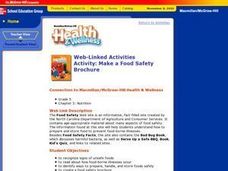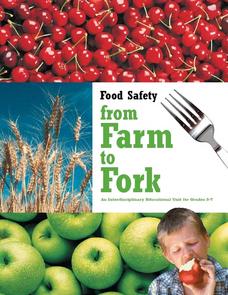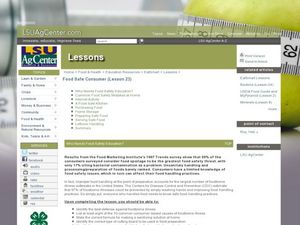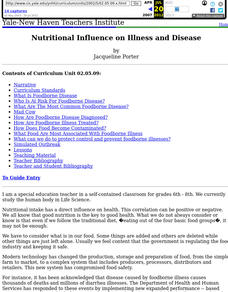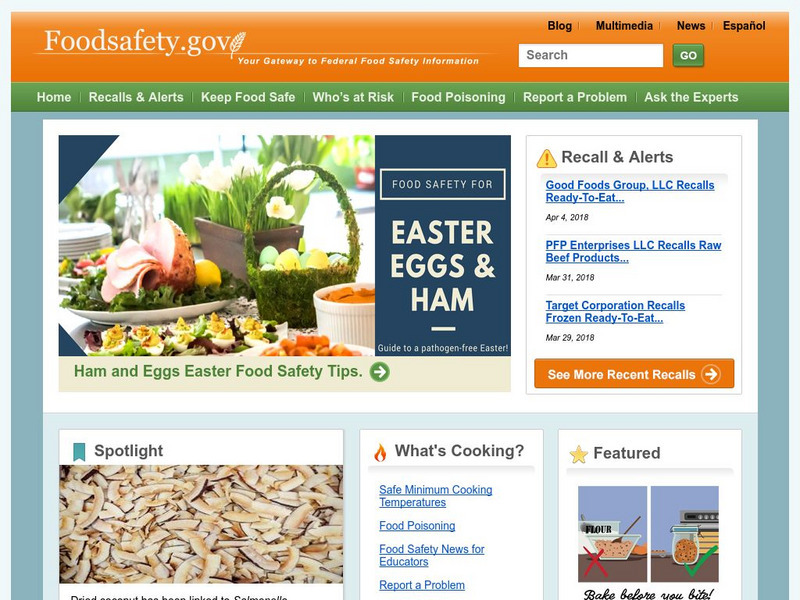University of Rhode Island
Food Safety Smart Curriculum
This is a must-have resource with everything you'll need for studying food safety with your pupils. From handwashing scorecards and cleaning kitchen surfaces to navigating the world of microbes and food-borne illnesses,...
National Library of Medicine
Your Environment, Your Health: Food Safety
Did youknow that chicken causes the greatest risk of food-borne illness. The fourth unit in a six-part series addresses food safety. Scholars research common scenarios of food causing illness through the National Institute for Health....
Curated OER
Make a Food Safety Brochure
Learners create brochures that inform their families how to prepare and store food to prevent food-borne illnesses. They research food safety facts and proper food-handling techniques on the internet.
Learning Games Lab
Controlling Water Activity in Food
Food storage matters! Scholars learn how the amount of water in corn can affect its rate of spoilage. They create a control group, then test three corn samples stored in three different locations for water activity. As a result of the...
Curated OER
Food for Spaceflight
When astronauts get hungry in outer space, they can't just call and have a pizza delivered. In order to gain an appreciation for the challenges associated with space travel, young learners are given the task of selecting,...
Curated OER
Food Safety From Food To Fork
Learners are introduced to the concept of food safety. In groups, they distinguish between fact and opinion and cause and effect while participating in a board game. They write an essay about what knowledge they gained and review the...
Learning Games Lab
Testing and Adjusting pH
Pupils learn how to control food spoilage by adjusting the food's pH. They see that one of the most dangerous bacteria can grow in food if people don't handle and store food properly. Using knowledge of the bacteria's preferred pH,...
Learning Games Lab
Understanding Water Activity
How does water activity play a role in food spoilage? First, the learners think about which types of foods would be best to take on a backpacking trip based on the water activity of different foods. It then walks through why water...
Curated OER
Food Safety and Quality Assurance
High schoolers identify and interpret how milk is processed and learn important concepts in food safety and quality assurance. They identify how milk is processed, the importance of food safety, and the quality assurance process....
Learning Games Lab
Gram Staining
Scholars use a lab simulation to test contaminated yogurt for bacteria by gram staining. They learn proper lab procedures for handling bacteria and for sterilizing equipment, and then walk through the process on their own to try gram...
Curated OER
What Is Special About Polyethylene Food Storage Bags?
Students participate in an investigation in which they compare a polyethylene bag designed for recycling or disposal with a polyethylene food storage bag. Students use hexane to determine the differences between the low density...
Learning Games Lab
How to Use Oil Immersion Microscope
Teach the class how to use a microscope to identify bacteria in food. Scholars explore the different parts of the microscope and learn how to determine total magnification. They walk step-by-step through the procedure of preparing slides...
Curated OER
Bacteria
Young scholars study food borne illnesses and what foods are more likely to carry them. In this investigative lesson students examine harmful bacteria.
Curated OER
Food Safe Consumer
Young scholars explain how to prepare and keep food safely. In this health science instructional activity, students research common mistakes and tips for maintaining a clean kitchen. They identify main causes of foodborne diseases.
Curated OER
Kitchen Equip and Lab Procedures - Level I
Students, in groups, record at least four pieces of equipment that fit a specified category as well as a safety tip to observe when using the equipment.
Curated OER
Nutritional Influence on Illness and Disease
Students examine nutritionally related diseases and illnesses, evaluating studies and developing topics for a science fair project. They investigate bacteria, researching how it can be harmful or helpful, and create illustrated displays.
Curated OER
Spider Activities, Experiments and Projects
Students examine seven spiders and put them into two or three groups based on their structural similarities. In groups, they create a cladogram proposing possible ancestral relationships. Students design an experiment related to their...
Curated OER
Make Sense of Nature
Students participate in this program that heightens their awareness and curiosity of nature as well as their sense of adventure and exploring new surroundings. They identify and choose an object from nature after exploring it with other...
Curated OER
Charlotte and Her Relatives Visit the Classroom: Spider Activities, Experiments and Projects
Students compare and contrast different spider species that they capture and maintain in the classroom for several days. They identify and research the species characteristics and living requirements then conduct an experiment on spider...
Other
U.s. Department of Health and Human Services: Food Safety
Government guidelines on food safety and information on foodborne pathogens and preventing illness via proper food preparation and storage.
University of Arizona
University of Arizona: Staphylococcus Aureus
This site is provided for by the University of Arizona. Food safety, preparation, and storage tips - related to staphylococcus. A description of what it is and how you can prevent it during food preparation.
Other
Still Tasty: Keep It or Toss It
A visually rich database of common food items that can be searched by name or by category, with information about how long each item will last and under what storage conditions. Tips on the best methods of storage are also provided.
Other
Still Tasty: Keep It or Toss It
StillTasty.com's Keep It Or Toss It is a useful website to help determine how long foods are good for and how to best store food to keep it safe for eating. Not only do you keep yourself healthy by eating safely stored food, but it also...


